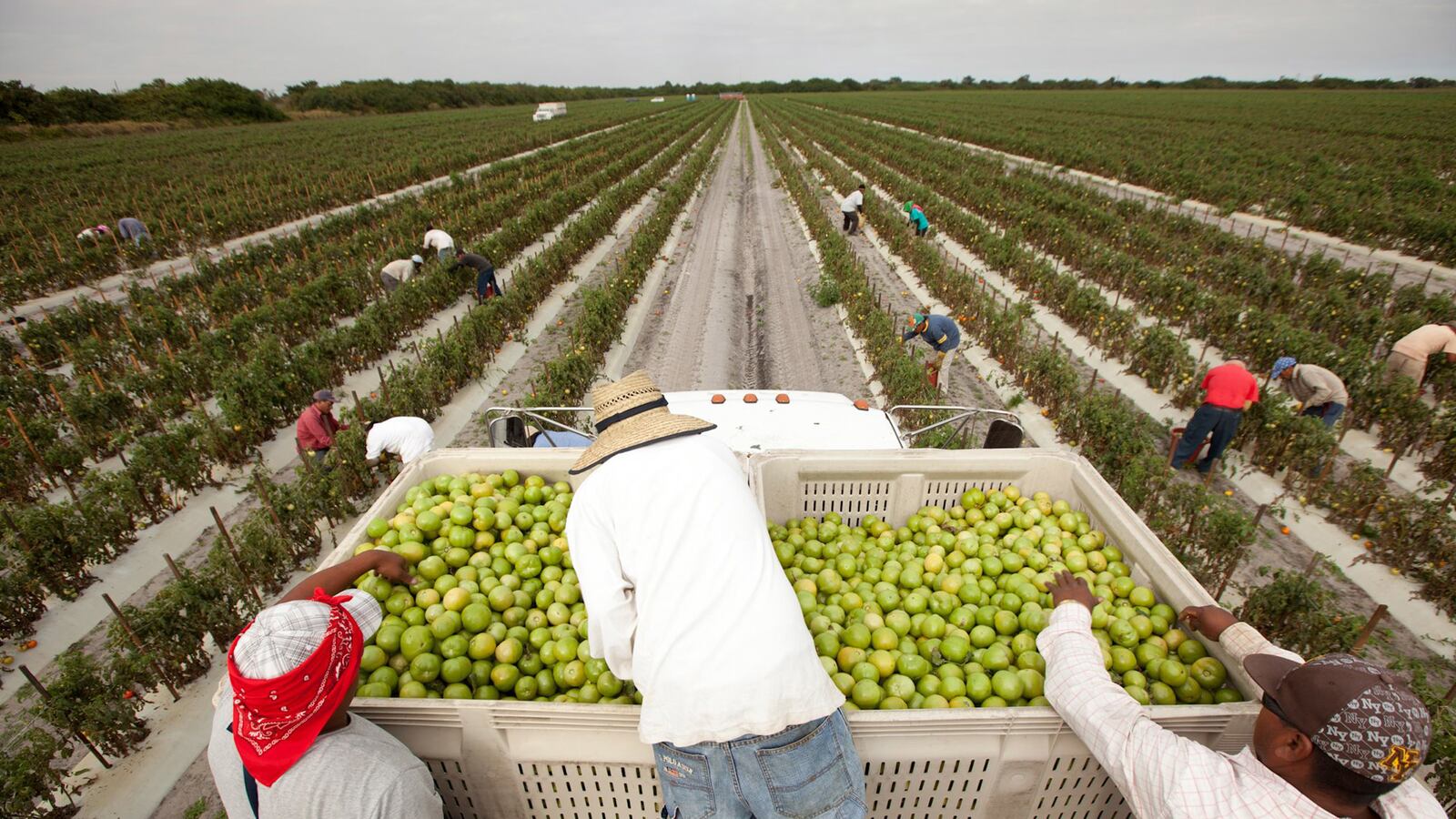Publix Super Markets likes to refer to itself as the place “Where shopping is a pleasure.”
But if “Food Chains,” a new documentary opening Nov. 21, is any indication, the Lakeland, Fla.-based company, a $27 billion business, seems unconcerned with the living and working conditions of the laborers who pick the fruits and vegetables sold in their stores.
“They are set in their ways, and they come out of a system where workers have always been treated like peons,” says Sanjay Rawal, director of ”Food Chains.”. “Workers in the fields, it’s economic segregation—out of sight, out of mind.”
Yet “Food Chains” is not just about Publix, even though the film centers around the company’s refusal to talk to a group of tomato field laborers known as the Coalition of Immokalee (Fla.) Workers (CIW).
The CIW has been asking the chain to sign onto to a series of fair labor practices in the growing fields, and the documentary uses this struggle to explore the status of farm labor in this country. Sadly, that status hasn’t changed much since the days of Cesar Chavez, who, with Dolores Huerta, co-founded the United Farm Workers, which fought for the rights of California grape pickers and other farm laborers in the 1970s. Chavez’ activism led to higher wages and collective bargaining rights for California workers, but over the years those rights have eroded, due to a number of factors.
“In California, the Republican administration in the ’80s began rolling back the protections the workers had gained,” says Rawal. “And in the late ’80s, the supermarket industry began consolidating its power. Previously farmers had much more ability to set prices.”
With prices depressed, wages for workers remained stagnant. And the 1994 North American Free Trade Agreement created, Rawal says, an “exodus of displaced farmers in Mexico that immigrated to the U.S. You end up with a workforce that doesn’t complain, because they can’t.”
“Food Chains” also explores the peculiarities of Central Florida’s agricultural industry. In a state where the sugar, orange, and tomato workers were once predominantly black, the Klan has long had a powerful influence, and a system of debt peonage—workers weren’t paid in dollars, but in goods and services—meant that fear and debt were a constant. “In Central Florida until the 1970s, at least, you didn’t have the same opportunities as African-Americans in other parts of the country,” says Rawal.
It is in this almost Third World atmosphere, vividly described in the Pulitzer Prize-winning book Devil In the Grove, that the Publix chain emerged (the first market opened in 1930). Yet Publix is nothing if not schizophrenic. It ranked #67 on Fortune Magazine’s 2011 list of 100 Best Companies To Work For, and, says Rawal, “the workers in their stores are some of the most satisfied in the country; they are paid well, and they get good benefits.”
But when it comes to the workers in the fields, and Publix’ ability, through its purchasing power, to influence how they are treated and paid, the chain takes a hands off approach. “Publix remains the focus of a campaign by the Coalition of Immokalee Workers (CIW), who seek to pressure us, to become involved in the employment relationship between Florida farmers who grow tomatoes and the farmworkers they employ to harvest their product,” says Publix spokeswoman Maria Brous. “Since first approached by the CIW in 2009, we have consistently viewed this as a labor dispute, and our position remains the same today.”
By taking this tack, Publix turns a blind eye to labor and living conditions in the tomato fields that, as described in “Food Chains,” are almost feudal:
• The overwhelmingly Hispanic workforce often lives in trailers, with 15 or more workers in a single trailer.
• In a good week, a picker can earn as much as $400, but can make as little as $50-$100. Annual wages range from $10,000-$13,000, well below the poverty line of $23,000 for a family of four.
• On an average workday, which can last 12 hours, a worker picks 4,000 pounds of tomatoes.
• There is little government oversight about working conditions in the fields—Florida has only 14 inspectors for 40,000 farms—and partially because of this, sexual harassment is rampant, and modern-day slavery is not uncommon: between 1997-2010 over 1,000 workers were freed from slavery in Florida alone.
The CIW is asking that Publix pay 1 cent more per pound for the tomatoes it buys, which could go directly to worker’s salaries, and represents just $1 million out of the chain’s $2 billion annual profit. Publix’s Brous responds “We will not pay employees of other companies directly for their labor. That is the responsibility of their employer.”
“Food Chains” also details how the CIW is promoting a Campaign For Fair Food, which educates consumers on labor exploitation in the fields, and works, as their website puts it, to forge “alliances between farmworkers and consumers in an effort to enlist the market power of major corporate buyers to help end that exploitation.”
Walmart, the country’s largest grocery chain, has signed onto the program, as have Burger King, Whole Foods, McDonald’s, Taco Bell and other major businesses. They have all agreed to pay one penny more per pound of tomatoes and require Code of Conduct to be implemented in the farms they buy from. Walmart has gone even further, agreeing to extend this agreement to other crops in its supply chain.
In Cesar Chavez’s day, product boycotts, strikes and other non-violent tactics helped bring about change. But those tactics seem old school today. “Food Chains” shows how the CIW is using a completely new methodology—contract law—to make a difference in the growing fields.
“Legislation has failed farmworkers in this country,” says Rawal. “There are laws against sexual harassment and slavery, but what is the enforcement? So the CIW has looked to the marketplace to enforce these guarantees. The strength of the labor movement lies in contract law, not civil law.”






